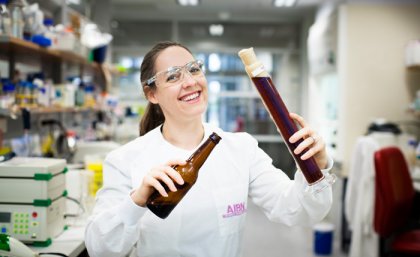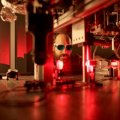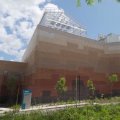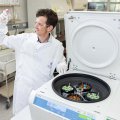
The science behind beer and barbecues will be on show – and taste – when The University of Queensland launches National Science Week celebrations in Brisbane on Saturday 16 August.
Visitors to the free public event will be able to chat with beer brewers and food scientists, and sample local produce.
The event at the Brisbane Convention and Exhibition Centre will harness this year’s National Science Week theme of ‘Food for our future: science feeding the world’.
Food scientists and industry experts will showcase products and discuss topics including the science of brewing beer, producing and barbecuing the perfect steak, the importance of food sustainability, and how science is improving foods for a better future for millions of people.
University of Queensland Vice-Chancellor and President Professor Peter Høj said the event would bring together some of the State’s brightest minds.
“Science plays a vital role in virtually everything we eat and drink,” he said.
“It influences every stage of the process, from the soils and barns to restaurants and homes.
“The event will celebrate the important contributions Australian scientists are making to improve our food and beverage industries.
“UQ’s Agriculture and Forestry courses and research rank among the best in the world, and the University has a direct impact on Australia’s agricultural and food industries.”
Science Minister Ian Walker said Queensland had significant strengths in food science and technology.
“This quintessentially Queensland event will be a fun opportunity to recognise the significant contributions Australian scientists are making to improve the food industry in our State, our nation and the world,” said Mr Walker.
The launch will be hosted by The University of Queensland and the Queensland National Science Week Committee.
Event details:
When: Saturday, 16 August, 3.30pm – 6.30pm (official welcome at 4pm)
Where: Boulevard Auditorium, Brisbane Exhibition and Convention Centre, via Grey Street entrance
Who: The event is free and open to the public
Activities: Food demonstrations, food and beverage samples, and short talks by local experts
Register: To register for the event, please visit bit.ly/QldNSWk2014
Exhibitors: XXXX Lion Nathan, Dr Joel Gilmore, Sugarbag Bees, Green Living Australia, Nick’s Chocolates, The University of Queensland and Queensland University of Technology
Guest speakers:
Dr Claudia Vickers, The University of Queensland’s Australian Institute for Bioengineering and Nanotechnology, speaking on ‘The science of beer’.
Dr David Poulsen, Science Leader - Innovative Food Solutions & Technologies, Agri-Science Queensland, Department of Agriculture, Fisheries and Forestry, on ‘A plateful of science’.
Richard Webb, seafood sustainability advocate and former chef and owner of Swampdog Fish and Chip shop, on ‘Better Fish: getting hooked on sustainable seafood’.
Associate Professor Ben Debrow, Centre for Health Practice Innovation, Griffith Health Institute, on ‘Improving the hydrating effects of beer’.
Professor Tristan Perez, Leader – Agricultural Robotics, Queensland University of Technology, on ‘Insights into future agricultural robotic systems’.
Martin Latter, Executive Chef, Brisbane Convention and Exhibition Centre, on ‘Fresh is best: a Queensland chef’s perspective’. Professor Mark Morrison, UQ Diamantina Institute, on ‘Can you make friends with salad? The answer lies in your gut microbiome!’
Professor Neal Menzies, Head of School of Agriculture and Food Sciences and Dean of Agriculture, The University of Queensland.
Media: Gemma Ward, UQ Institute for Molecular Bioscience, 07 3346 2134 or g.ward1@uq.edu.au or Caroline Bird, UQ Office of Marketing and Communications, 07 3365 1130 or c.bird1@uq.edu.au
Ruth Neale, UQ Australian Institute for Bioengineering and Nanotechnology, 07 3346 3965 r.neale1@uq.edu.au
About National Science Week
National Science Week (16-24 Aug) is Australia’s annual celebration of science and technology.
Now entering its 16th year, it is the country’s largest festival, hosting more than 1000 community events nationwide and reaching an audience of more than a million people. http://www.scienceweek.net.au/



-Megan-Pope-UQ_620.jpg?itok=HheutY-P)







